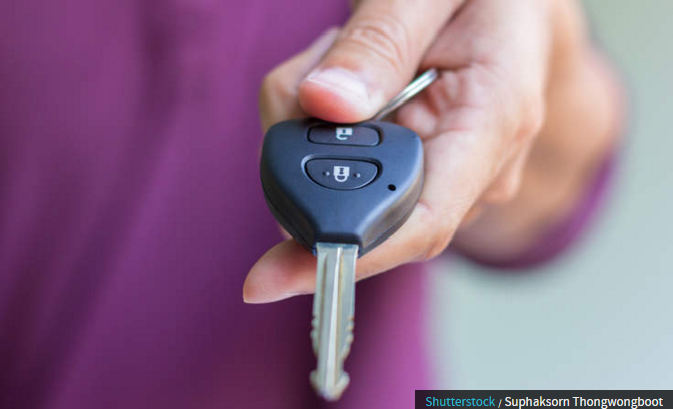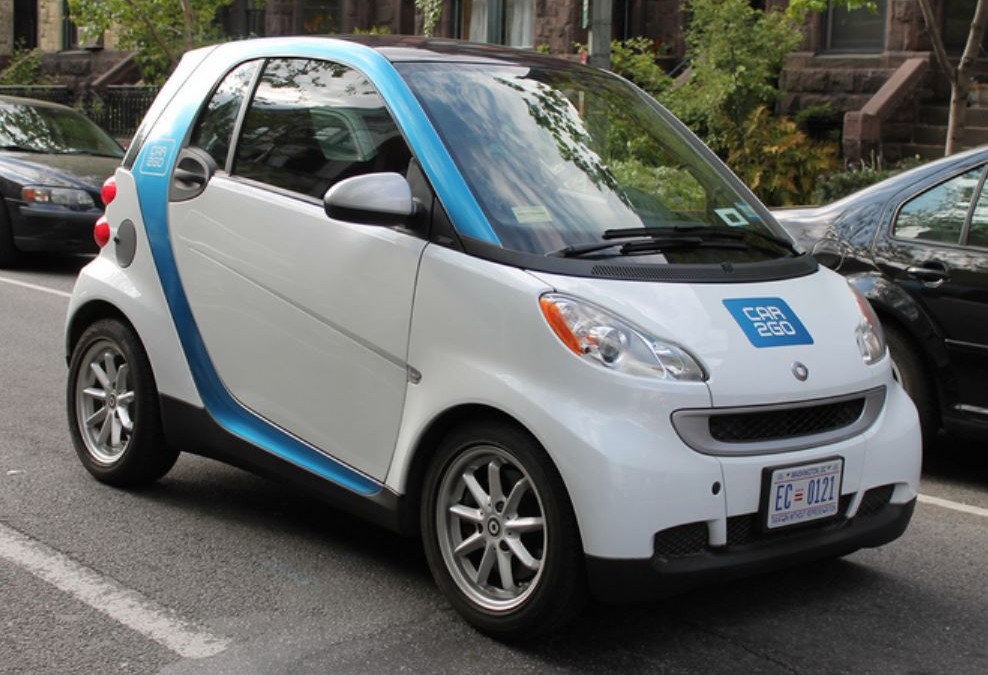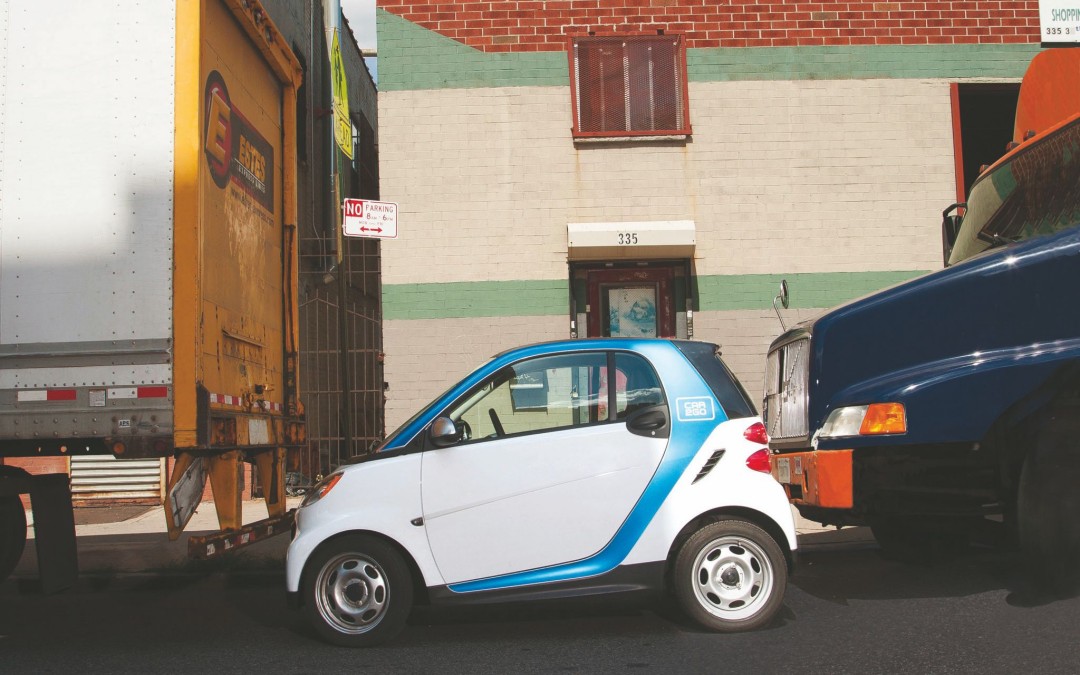
by Innovative Mobility Research | Oct 23, 2015 |
Lauren Hepler Wednesday, October 21, 2015 – 2:30am Owning a car in Manhattan has traditionally ranked pretty far up the list of pricey personal indulgences (that is, aside from opting to live in New York City in the first place). But with automakers looking to hang onto market share amid a surge in competition from shared car services, a new category of faux car ownership — on-demand shared cars located inside your own building — could change the economics of driving in busy urban areas. General Motors is one company pushing into this space through a deal with New York real estate firm Stonehenge Partners, where residents of the 479-unit Ritz Plaza apartment building can purchase access to a fleet of shared SUVs parked in their garage. To read the rest of the article, click...

by Innovative Mobility Research | Oct 5, 2015 |
Uber steers focus towards carpooling by Leslie Hook Uber started out with an upmarket limousine service, but the insurgent ride-hailing group has recently been moving in an altogether different direction: carpooling. “We are trying to induce the carpooling thing,” Travis Kalanick, chief executive, said earlier this month, pedalling his hands in front of him as if to illustrate people sharing a taxi. “That is exciting, that’s two cars becoming one.” The service has the potential to transform urban transportation, but only if the company and its rivals can make the algorithms work. Already in its home city of San Francisco, the UberPool service accounts for nearly half of journeys with Uber and is profitable one year after it was launched. Mr Kalanick was referring to shared-taxi services, the latest battleground between Uber and its rivals such as Lyft and China’s Didi Kuaidi. Lyft, which grew out of a start-up offering city-to-city ride-sharing, has its own such service, Line, that accounts for more than half of journeys taken with it in San Francisco. On the other side of the world, Hitch, Didi Kuaidi’s commuter carpooling service in China, is organising up to 700,000 trips a day, just three months after launch. For more details, click...

by Innovative Mobility Research | Sep 9, 2015 |
BY AMANDA M. EAKEN AND SUSAN A. SHAHEEN The sharing economy – the idea that we can access goods and services more affordably and with less effort by sharing the costs and responsibility with others – is taking hold, especially in transportation. PricewaterhouseCoopers predicts the global sharing economy could grow to as much as $335 billion in the next 10 years. California is poised to reap many early benefits of the sharing economy because three of the biggest brand names – Airbnb, Uber and Lyft – are based in the Bay Area. Much has been written about the sharing phenomenon from a consumer and business perspective, but little has been said about the environmental and social impacts of these rapidly growing enterprises, especially in transportation in California. Read more here:...

by Innovative Mobility Research | Aug 14, 2015 |
This afternoon, Council Member Mark Levine will introduce a bill [PDF 1, 2] requiring DOT to give car-share companies designated on-street parking spaces, potentially for a price. Guaranteed parking would boost car sharing, Levine says, and reduce car ownership. Trouble is, there’s not much data to say whether or not car-share in New York is reducing vehicle ownership or just encouraging more driving. Levine introduced the bill days after Car2Go announced an expansion into western Queens. The company, owned by auto giant Daimler, offers a fleet of 450 Smart cars in a 36 square-mile zone covering the western half of Brooklyn, from Greenpoint to Coney Island. Starting August 29, the company is adding another 100 vehicles and eight square miles in Long Island City, Astoria, Woodside, and Sunnyside. Customers of the point-to-point service can start and end trips in any free curbside parking space. There isn’t enough research to back or refute Levine’s intuition. That’s for two reasons. First, most scholarship has focused on round-trip services like Zipcar, whose customers start and finish their trips in the same parking spot. Second, there isn’t much data on cities with New York’s level of density, transit service, and low car ownership rates. Susan Shaheen, a car-share expert at the University of California, Berkeley, said car-share has a varied impact, depending on each customer’s circumstances. “Many individuals will drive marginally more,” she said in an email. “Other individuals will drive substantially less, as they alter their relationship with the private auto to one of necessity rather than convenience.” In fact, one of the advantages of car-share is that it calculates the cost of driving using a per-minute or per-hour rate. In contrast, car ownership frontloads big expenses like insurance and car payments, making each subsequent trip...

by Innovative Mobility Research | Aug 14, 2015 |
Car-sharing companies like Car2go and Zipcar may soon be getting some help parking their vehicles curbside, thanks to a City Council bill introduced Thursday. But it’s unclear whether local residents would be willing to give private companies special access to public parking spots. Car-share firms themselves may not even need the special treatment for their members to easily find street parking, they say. The bill, submitted by Councilman Mark Levine, would require the Department of Transportation to establish a program that would provide car-sharing businesses with dedicated parking spaces that would include metered spots as well as free spaces set aside for their cars. Companies would apply to be part of the program, and, if accepted, pay the city for metered parking, though not for spaces reserved for them elsewhere. Crain’s wrote about Car2go in a cover story in this week’s issue. Car2go is currently cooperating with transportation expert Susan Shaheen on a study that will see what effect its Smart cars have on private-car use and ownership—data that could prove helpful in winning over the Department of Transportation. Zipcar, whose model has been shown to reduce private-car use, also was unfamiliar with the bill. A spokeswoman said, however, that street parking has proved highly popular with members in cities where it’s permitted. To read more, click...






